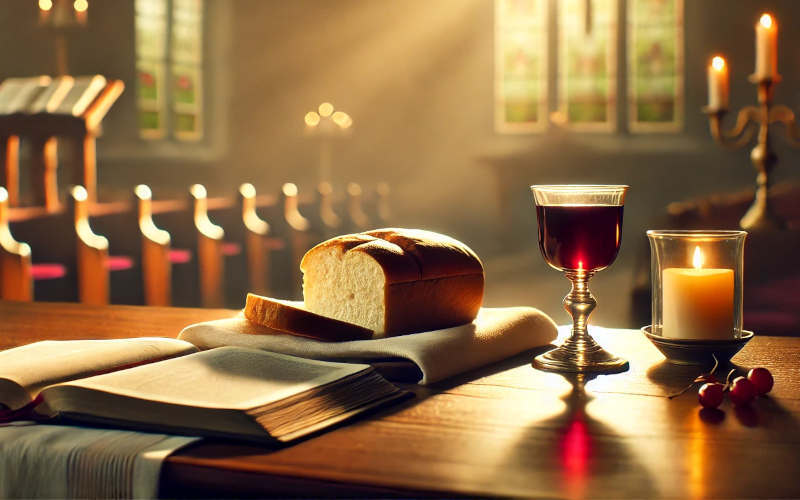The Power of an Empty Cup

Imagine trying to pour water into a cup that’s already full. No matter how refreshing or life-giving the water is, it simply spills over, wasted and unable to be received. This simple yet profound analogy captures a critical truth about our spiritual lives: when we approach God with our minds already made up, with our hearts cluttered with preconceived ideas, there's no room left for the transformative power of His grace.
In the Gospel of Luke, we encounter two disciples on the road to Emmaus, their hearts heavy with grief and disappointment. They had placed all their hopes in Jesus of Nazareth, believing that He would be the one to redeem Israel. But now, their hopes lay buried in a tomb, and they were left with a cup full of sorrow and unmet expectations.
As they walked, a stranger joined them, though they did not recognize Him. He asked about their troubled conversation, and they poured out their hearts, lamenting, “But we had hoped that he was the one who was going to redeem Israel” (Luke 24:21). Their story was one of dashed hopes, of a Messiah who had failed to deliver. Their cup was full, overflowing with their own narrative, and there was no space for the truth that this stranger, who was Jesus himself, was about to reveal.
This encounter on the road to Emmaus is a powerful reminder of how our own stories, our own expectations, can blind us to what God is doing right in front of us. The disciples couldn’t see the risen Christ walking beside them because their hearts and minds were filled with the wrong story. They were clinging to a vision of a political saviour who would liberate them from Roman oppression, and in doing so, they missed the greater liberation that Jesus was offering—a freedom not from Rome, but from sin and death.
Jesus, ever patient and full of grace, began to empty their cups. He opened the Scriptures to them, starting with Moses and all the Prophets, explaining how the Messiah had to suffer these things and then enter into His glory. He was gently pouring out the old, making room for the new. It wasn’t until they sat down to break bread with Him that their eyes were opened, and they recognized Him. In that moment, their hearts, once heavy and full of despair, were filled with joy and revelation. They had made space for the truth, and in doing so, they were filled with the living water that Jesus offers to all who believe.
How often do we find ourselves in the same position as these disciples? We approach God with our own stories, our own agendas, and our own expectations. We come with cups already full, asking God to bless our plans, to meet our demands, to fit into the narrative we’ve crafted. But the truth is, God’s plans are so much greater, so much more life-giving, than anything we could imagine. Yet, to receive His plans, we must first empty our cups.
This is the essence of Jesus’s teachings in the Beatitudes. “Blessed are the poor in spirit,” He said, “for theirs is the kingdom of heaven” (Matthew 5:3). To be poor in spirit is to come before God with an empty cup, acknowledging our need for Him and our inability to fill ourselves. It is to be humble, to recognize that our wisdom is insufficient, and to make room for God to pour in His grace, His wisdom, and His love.
The world teaches us to be self-sufficient, to fill our cups with accomplishments, possessions, and control. But Jesus turns this upside down. He teaches that the blessed life, the life that truly flourishes, is one where we recognize our emptiness, where we hunger and thirst for righteousness, and where we are willing to let go of our own stories to receive the story God is writing.
Consider the Apostle Paul, whose life was radically transformed when he encountered the risen Christ on the road to Damascus. Paul’s cup had been full—full of zeal, full of certainty, full of his own righteousness. But that encounter with Jesus shattered everything he thought he knew. He was left blind and broken, with an empty cup, and it was in that emptiness that God began to pour in the truth, the grace, and the mission that would define Paul’s life. Paul later wrote to the Ephesians, “But to each one of us grace has been given as Christ apportioned it. This is why it says: ‘When he ascended on high, he took many captives and gave gifts to his people’” (Ephesians 4:7-8). Paul had learned that it’s only when our cups are empty that we can be filled with the gifts of God.
This principle is not just a spiritual truth; it’s a practical one as well. How often do we try to fix the world around us, to change our circumstances, while holding on to our own ways of thinking and doing things? We pray for peace, but our hearts are full of anger and resentment. We ask for guidance, but we’ve already decided what we’re going to do. We seek God’s blessing, but we’re unwilling to let go of the things that clutter our lives.
Jesus invites us to a different way. He invites us to empty our cups, to let go of our own stories, and to trust that His story is far greater. He invites us to surrender our lives, our plans, and our desires to Him, and to make room for the abundant life He promises.
As we see the events in Israel and Gaza unfold, the violence and suffering that seem overwhelming, let us remember that the solution begins with us. It begins with emptying our cups of hatred, of prejudice, of our own narratives that justify violence. It begins with making room for God’s story—a story of love, of reconciliation, of peace that surpasses all understanding.
In this world of overflowing cups, Jesus calls us to be poor in spirit, to be those who mourn, who are meek, who hunger and thirst for righteousness. He calls us to be merciful, pure in heart, and peacemakers. And He promises that when we empty our cups of the world’s wisdom, He will fill us with the wisdom from above, with the living water that never runs dry.
So today, let us ask ourselves: What is filling our cups? What are the stories we’re clinging to? And are we willing to let go, to pour them out, and to make room for the story that God wants to write in our lives? For only when our cups are empty can we truly be filled with the life, the love, and the grace of God.


